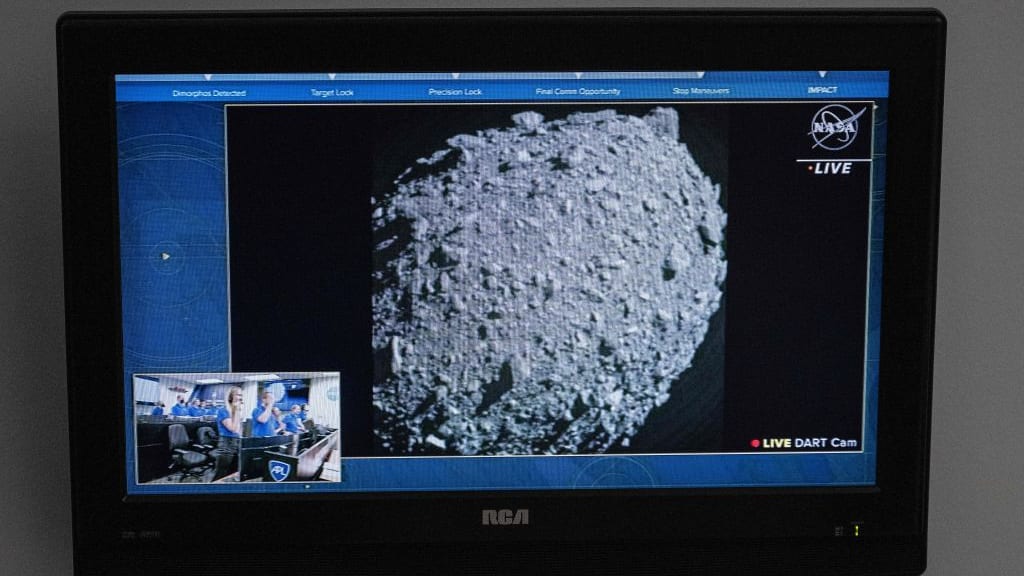Amateur stargazers recognized for their part in confirming DART mission's success


A free daily email with the biggest news stories of the day – and the best features from TheWeek.com
You are now subscribed
Your newsletter sign-up was successful
Amateur astronomers came in with the assist, providing images and data to NASA confirming that its DART mission was a success.
In September, the Double Asteroid Redirection Test (DART) spacecraft slammed into the Dimorphos asteroid at 14,000 miles per hour. NASA wanted to see if DART could knock the asteroid off its path, giving the agency a defense system in case a massive object was headed for Earth.
More than 30 people on four continents who have Unistellar smart telescopes shared their observations with NASA, and scientists then used that information to determine whether the orbit of Dimorphos was altered. The data helped NASA determine that yes, the mission was a success, and those Unistellar users have been named as co-authors of a paper published Wednesday in Nature, "Light Curves and Colors of the Ejecta From Dimorphos After the DART Impact."
The Week
Escape your echo chamber. Get the facts behind the news, plus analysis from multiple perspectives.

Sign up for The Week's Free Newsletters
From our morning news briefing to a weekly Good News Newsletter, get the best of The Week delivered directly to your inbox.
From our morning news briefing to a weekly Good News Newsletter, get the best of The Week delivered directly to your inbox.
Unistellar co-founder Laurent Marfisi told The Independent that the worldwide network of users "allows continuous observations of the night's sky, because it's always night somewhere in our network." Being part of a "major scientific breakthrough" is exciting, Marfisi said, and "marks our entry into an era where the general public is becoming a decisive player in the conquest of space, holding the key to more discoveries and wider dissemination of scientific knowledge."
A free daily email with the biggest news stories of the day – and the best features from TheWeek.com
Catherine Garcia has worked as a senior writer at The Week since 2014. Her writing and reporting have appeared in Entertainment Weekly, The New York Times, Wirecutter, NBC News and "The Book of Jezebel," among others. She's a graduate of the University of Redlands and the Columbia University Graduate School of Journalism.
-
 The ‘ravenous’ demand for Cornish minerals
The ‘ravenous’ demand for Cornish mineralsUnder the Radar Growing need for critical minerals to power tech has intensified ‘appetite’ for lithium, which could be a ‘huge boon’ for local economy
-
 Why are election experts taking Trump’s midterm threats seriously?
Why are election experts taking Trump’s midterm threats seriously?IN THE SPOTLIGHT As the president muses about polling place deployments and a centralized electoral system aimed at one-party control, lawmakers are taking this administration at its word
-
 ‘Restaurateurs have become millionaires’
‘Restaurateurs have become millionaires’Instant Opinion Opinion, comment and editorials of the day
-
 Nasa’s new dark matter map
Nasa’s new dark matter mapUnder the Radar High-resolution images may help scientists understand the ‘gravitational scaffolding into which everything else falls and is built into galaxies’
-
 Moon dust has earthly elements thanks to a magnetic bridge
Moon dust has earthly elements thanks to a magnetic bridgeUnder the radar The substances could help supply a lunar base
-
 How Mars influences Earth’s climate
How Mars influences Earth’s climateThe explainer A pull in the right direction
-
 The ‘eclipse of the century’ is coming in 2027
The ‘eclipse of the century’ is coming in 2027Under the radar It will last for over 6 minutes
-
 NASA discovered ‘resilient’ microbes in its cleanrooms
NASA discovered ‘resilient’ microbes in its cleanroomsUnder the radar The bacteria could contaminate space
-
 Artemis II: back to the Moon
Artemis II: back to the MoonThe Explainer Four astronauts will soon be blasting off into deep space – the first to do so in half a century
-
 The mysterious origin of a lemon-shaped exoplanet
The mysterious origin of a lemon-shaped exoplanetUnder the radar It may be made from a former star
-
 The 5 biggest astronomy stories of 2025
The 5 biggest astronomy stories of 2025In the spotlight From moons, to comets, to pop stars in orbit
